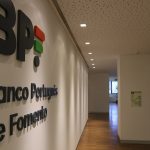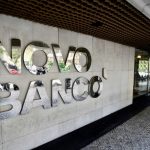Admiral calls for “ethical leadership” in Portugal to confront a new world order
Text: Chris Graeme; Photo: Fernando Bento
The former chief of staff of the Portuguese Navy, who looks likely to put himself forward as a candidate in the presidential elections in 2026, has called for “ethical leadership” in the face of “a new world order governed by the law of the strongest”.
Admiral Henrique Gouveia e Melo, who addressed a packed audience at a lunch organised by the International Club of Portugal on Friday in Lisbon in which he addressed the challenges of the changing geo-political landscape worldwide, said Portugal needed an “ethical and clear leadership that was committed to the country’s future”.
Highly respected and popular among the Portuguese people for his active role in being the figurehead for the Covid-19 vaccination campaign during the pandemic in 2020, the admiral said there was a “new world order dominated by the United States, Russia and China” in which the “law of the strong” prevailed and the rules of the State of law established after World War II were at risk of being dismantled.
“We have to be prepared to live in this world and for those who think it’s not going to be like that need to wake up as it’s just a question of time”, he warned.
And continued: “What we need is a leaderships that is capable of understanding the world in which we are living instead of looking to themselves and thinking about their own back yard”.
“We need leaders that look to the outside world and develop one of the pillars of democracy: prosperity. Without prosperity we can only distribute poverty and not wealth”, he warned.
Essential Business asked the admiral how Portugal would navigate this new world of conflicted interests, caught between Portugal’s economic reliance of the United States – it’s fourth biggest market after European Union states like, Spain, Germany and France – and China in which considerable investment and shareholdings in key Portuguese companies was made during the Great Recession and economic crisis from 2008-2014 in Portugal.
The question was posed on the back of China’s desire to “expand cooperation” with Portugal with green transition on the agenda.
China’s foreign minister, Wang Yi said on Tuesday last week that Portugal and China should strengthen bi-lateral relations and exchanges during a visit to China and Macau by Portuguese Minister of Foreign Affairs, Paul Rangel
Wang Yi stressed that Beijing was ready to “work with Portugal to build a more stable, fruitful and dynamic relationship”.
That could bring problems for Portugal after a former Republican US ambassador to Portugal, George E. Glass (2017-2021 made veiled warnings to the then Portuguese Minister of Foreign Affairs, Augusto Santos Silva, suggesting that Portugal needed to chose its commercial friends carefully if it wanted to enjoy a successful trade relationship with the US, after Portugal considered allowing Chinese telecoms giant Huawei to help it develop part of its 5G network.
A decade or more ago, commercial investment relations between the two countries during the PS government of José Sócrates and the PSD-CDS-PP coalition government of Pedro Passos Coelho were strong with several big ticket investments from Chinese public and private companies in areas such as energy (China Three Gorges’ stake in EDP); insurance (Chinese company Fosun’s investment in Fidelidade; banking (Haitong Bank Portugal is held by Haitong Securities Co.Ltd) and Bison Bank (Formerly Banif, it is now owned by Bison Capital Financial Holdings (Hong Kong) Limited, incorporated in Hong Kong;, automotive batteries (China Aviation Lithium Battery Technology (CALB); Beijing Enterprises Water Group (bought utility Veolia – Be Water), to name a few.
The admiral told Essential Business that “we will have to navigate the rocks in very shallow waters extremely carefully”.
Admiral Henrique Gouveia e Melo argued that Portugal needed leaders with strategic vision for the country in order to achieve greater prosperity, but also a leadership with values.
“Leadership has to have values and one of the basic values of leadership is ethics and about this I’m not going to say much more”, he said, hinting at Portugal’s main political parties point scoring against each other over allegations of lack of transparency and corruption.
Portugal is facing a general election on May 18 after the current caretaker government led by the centre-right PSD-CDS-PP and independents coalition fell over allegations of a conflict of interest in the Prime Minister Luís Montenegro’s business dealings. The government failed to get a confidence motion passed in the Portuguese parliament earlier in March.
But on the other hand, in a period of questions and answers at the end of his address, the admiral said on the topic of ethics that he didn’t want “immaculate angels” who didn’t know how to govern, rather he wanted parties to discuss solutions for the country during the election campaign which kicks off in earnest during April.
The admiral also left a veiled criticism for politicians who wanted to stir up instability without mentioning any names. (One can only suppose his target was the leader of the far-right populist party Chega, André Ventura).
“Permanent instability is dangerous for us. Choices will pass us by like a high-speed train, and if we miss the train we’ll once again miss an opportunity for the development we need to assert ourselves”. (economically)
And added: “This is not a national affirmation, but the affirmation of a people who want to have prosperity, fairness, freedom and security.”
Which is why he then called on Portugal’s business leaders to be “commanders and captains of new Portuguese sailing ships (in search of economic prosperity), because that is the only way that our society can be more inclusive, reduce imbalances and respond to that other pillar of democracy – equality”.
The possible candidate for the presidential elections refused to be drawn into when he would officially declare his intentions to stand (despite polls showing he would be the clear favorite to win in 2026) until after the general election on May 18 in which, so far, the PSD party looks likely to win following a win by the party in regional elections on the island of Madeira this month.










